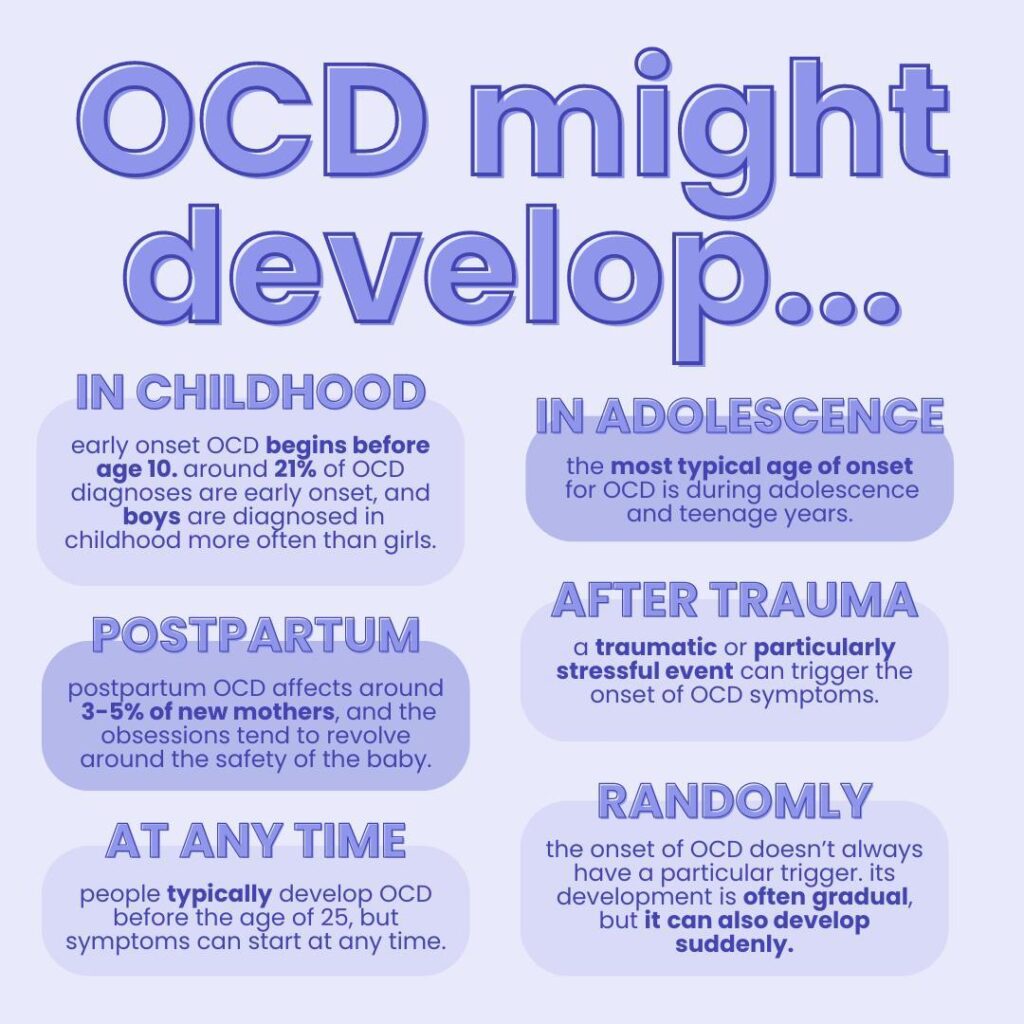Yes, obsessive-compulsive disorder (OCD) can develop later in life, though it most often begins in childhood, adolescence, or early adulthood. While the average onset is around 19, research shows that a significant number of people first experience symptoms in adulthood, including middle age and beyond.
In this article, we’ll explore when OCD can develop and how to find effective treatment to manage your symptoms.
What is the typical age of onset for OCD?
Most people with OCD first experience symptoms during their teenage years or early 20s. According to the Diagnostic and Statistical Manual of Mental Disorders (DSM-5), the average age of onset is 19, with 25% of cases beginning before the age of 14. However, there are also documented cases of late-onset OCD occurring after age 35, 50, or even 60.
This variation shows that while OCD often starts young, it is not limited to early life.
Can OCD begin in middle age or later?
Yes, OCD can first appear in middle age or later. Although less common, research has documented late-onset OCD in adults over 40. In some studies, up to 15% of people with OCD report symptom onset after age 35.
Late-onset cases may be overlooked or misdiagnosed because OCD is more strongly associated with younger populations, leading to delays in treatment.
Why might OCD develop later in life?
When OCD begins in adulthood, it may be linked to a combination of genetic, biological, and environmental factors.
Some potential triggers include:
- Stressful life events: Divorce, bereavement, retirement, or health challenges can contribute to OCD onset.
- Neurological changes: Conditions such as Parkinson’s disease, dementia, or stroke have been linked to OCD symptoms in later life.
- Hormonal changes: Shifts in hormone levels during menopause or andropause may influence onset.
- Underlying vulnerability: People with a genetic predisposition to OCD may not show symptoms until a significant life stressor activates them.
What does late-onset OCD look like?
The symptoms of late-onset OCD are the same as early-onset OCD, involving obsessions (intrusive thoughts, images, sensations, feelings, or urges) and compulsions (repetitive physical or mental acts to reduce distress).
However, in older adults, the presentation may look a bit different:
- Contamination fears linked to health and illness
- Checking behaviors (e.g., appliances, locks, medical appointments)
- Symmetry or “just right” compulsions
- Religious or moral obsessions
- Health-related intrusive thoughts
Because these behaviors can overlap with anxiety, depression, or cognitive decline, proper diagnosis is necessary.
How is OCD diagnosed later in life?
OCD can be diagnosed at any age if symptoms meet the standard criteria: the presence of obsessions and/or compulsive behaviors that are time-consuming (more than an hour a day) and cause distress or impairment.
In older adults, clinicians must also rule out conditions such as dementia, generalized anxiety disorder (GAD), or depression, which can mimic certain OCD symptoms.
Can late-onset OCD be treated effectively?
Yes, treatment for OCD is effective regardless of when the condition develops. The most evidence-based treatment is exposure and response prevention (ERP) therapy. ERP is a specialized form of cognitive behavioral therapy (CBT) proven to be effective for OCD. General CBT, if not tailored for OCD, can sometimes be unhelpful or even worsen symptoms.
Studies show that ERP therapy is highly effective, with 80% of people with OCD experiencing a significant reduction in their symptoms.
Other approaches that may help include:
- Medication (typically SSRIs)
- Mindfulness-based strategies
- Acceptance and commitment therapy (ACT)
These are typically done in combination with ERP therapy, depending on the individual’s needs.
Severe or treatment-resistant OCD may benefit from the following therapies:
- Intensive outpatient programs (IOPs)
- Partial hospital programs (PHPs)
- Residential treatment centers (RTCs)
- Transcranial magnetic stimulation (TMS)
- Deep brain stimulation (DBS)
- Gamma knife radiosurgery (GKRS)
With the right treatment, many people with late-onset OCD experience significant improvement in symptoms and quality of life.
Find the right OCD therapist for you
All our therapists are licensed and trained in exposure and response prevention therapy (ERP), the gold standard treatment for OCD.
Bottom line
OCD most often begins in youth, but it can also develop later in life. Whether symptoms start at 15, 35, or 65, OCD is a treatable condition. If you notice intrusive thoughts and compulsive behaviors interfering with your daily life, professional help is available—and effective treatment can begin at any age.
Key takeaways
- OCD most commonly develops around age 19, but onset can occur at any age, even after 35.
- Symptoms may begin gradually or suddenly (acute onset).
- Life events, stress, and genetic or biological factors may all play a role in when OCD emerges.
- Evidence-based treatments like exposure and response prevention (ERP) therapy and medication are highly effective for OCD at any age.


